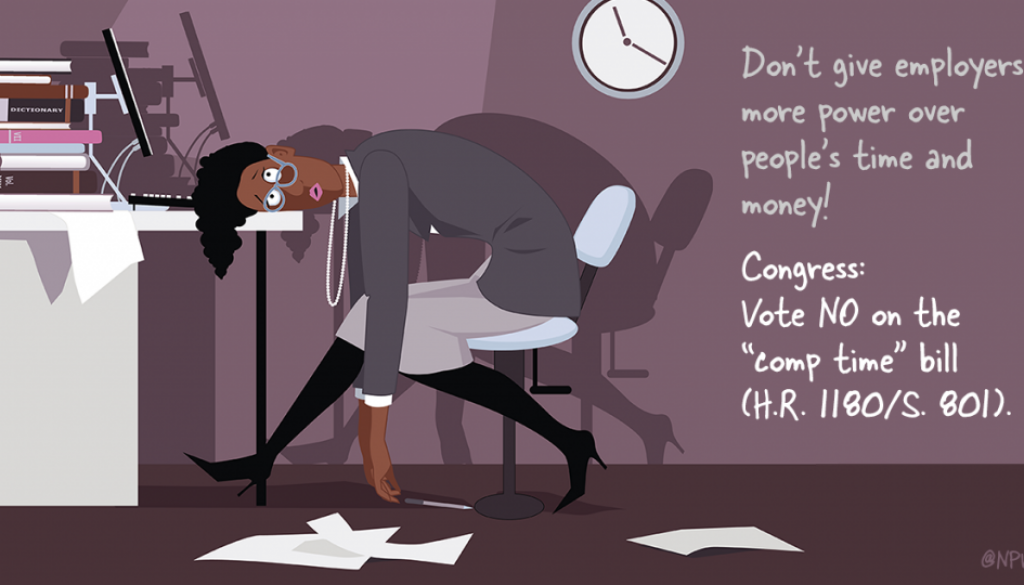The Chamber’s War on Workers: Comp Time Edition
The new Republican Congress is only four months old, but it’s already shown that it cares far more about big corporations than the millions of Americans who work for them. This Congress has made the U.S. Chamber of Commerce’s priorities its priorities, and this week, the House is set to vote on a bill that is the latest front in the Chamber’s War on Workers.
The deceptively named Working Families Flexibility Act (H.R. 1180/S. 801), introduced by Rep. Martha Roby (R – Ala.) and Sen. Mike Lee (R – Utah), and vigorously supported by the Chamber would allow employers to offer comp time as an alternative to time-and-a-half overtime pay when employees work more than 40 hours in a week. H.R. 1180 would give even more power to employers over employees’ wages and working hours and further undermine workers’ ability to make ends meet, while doing nothing to increase flexibility for employees.
Last month, Leonard Court testified in support of H.R. 1180 on behalf of the Chamber at a House Education and Workforce Committee Hearing. In his testimony, Court stated, among many other false narratives, that “the decision to opt for comp time always rests with the employee, not the employer.” Unfortunately, this is not the case. H.R. 1180 further widens the power gap between an employee and her or her employer in a number of ways, making it a bill that Public Citizen opposes.
Under the law, employers would have the final say as to whether to offer an employee comp time instead of overtime, and have the power to deny an employee’s request to use their comp time. For example, an employee who had opted to receive comp time for overtime hours worked could have enough hours saved up to take off work to care for a sick family member, but could still have her request denied by her boss.
What’s more, there is no guarantee that an employee who does not accept comp time in lieu of time and half overtime pay would not find herself penalized with fewer hours and loss of overtime work. An employer who wants to avoid paying overtime may just stop asking employees that refuse comp time to work overtime and instead ask employees amenable to comp time to work extra hours. Such employees will see their earnings decline without any corresponding benefits if this bill becomes law.
The Working Families Flexibility Act- or rather the Betrayal of Working Families Act- would be a step in the wrong direction for hourly, full-time workers as well as for salaried, non-exempt workers who are eligible for overtime pay. Instead of providing working people and their families with the time off and the financial stability they need to care for themselves and their loved ones, this “flexibility” bill offers forced choices and false promises.
In addition to providing employers with even more power over their employees, H.R. 1180 increases the already not-insignificant incentive for employers to hire fewer people and instead rely on existing employees working overtime hours to get the job done. Under H.R. 1180, employers can “pay” for these overtime hours in future comp time, as opposed to having to pay for them immediately in wages. This in turn could mean that H.R. 1180 could result in less hiring, leaving more people unemployed.
Workers are never better off if they accept comp time in lieu of overtime pay, but instead, can end up in a much worse situation with increased risk and delay in pay. The Fair Labor Standards Act is already in place to allow an employer to grant time off to employees who work overtime, and H.R. 1180 adds nothing new in this regard.
This legislation is a classic case of Chamber smoke and mirrors. This bill would make it harder for people who need to work extra hours to pay their bills while providing no real guarantee of increased comp time. Its ultimate goal is to make labor cheaper for corporations. Of course, in so doing, it takes money out of the pockets of working people.
It’s a shame that the GOP Congress has embraced another Chamber-touted windfall for big business. But why should we be surprised? After all, when the Chamber and other corporate interests spend big on elections, we wind up with politicians who are beholden to corporations rather than the American people.



